Quantum computing may sound like science fiction but here's why we need to take it seriously
It may take up to two decades before quantum computing's potential is realised, but countries and corporations are investing heavily in this potentially game-changing technology so that they can be ahead of the pack.

In May 2024, the Singapore government announced that it would invest S$300 million (US$233 million) to fuel quantum technology research and to grow the specialised talent pool here. (Illustration: CNA/Samuel Woo)

This audio is generated by an AI tool.
In a highly secure lab in the United States, at technology company IBM's research facility just outside of New York City, a cryogenic refrigerator hums away, keeping temperatures ultra-cold – icier than the depths of outer space.
Also known as a dilution refrigerator, it keeps temperatures plunged near absolute zero (-273.15°C). The tangle of cylindrical vessels and wires safeguards other complex parts that make up an extremely temperature-sensitive piece of technology at its heart.
A growing number of scientists believe these components may well represent the future of computing, technology more broadly, and even society itself.
A similar device that, like its IBM counterpart, looks like something straight out of a science fiction movie also sits at a Google research lab in Santa Barbara, California.
Both of these are quantum computers, devices that some people believe will enable breakthroughs such as the discovery of new materials, cures to diseases and more powerful artificial intelligence (AI).
So far, given the cost and technology required, there are only an estimated 100 to 200 quantum computers globally, though not all are operational or harness the full potential capabilities of quantum.
Some countries such as China and the US are investing heavily in quantum technology, hoping to be among the first to harness its immense potential. Among the different quantum technologies is quantum computing, which experts say has the greatest potential.
Singapore is making strides in this field, too. In his National Day Rally speech on Aug 17, Prime Minister Lawrence Wong cited quantum computing as an example of the nation's long-term commitment to frontier research.
"It is a completely new way of processing information, with the potential to transform many industries," he said. "It is still early days, but we may see breakthroughs 10 or 20 years from now."
Mr Wong's speech hinted at the burgeoning industry that some experts believe could be as valuable as the global semiconductor industry in the future.
In May 2024, the government announced the National Quantum Strategy, an investment of S$300 million (US$233 million) to fuel quantum technology research in Singapore, as well as to grow the specialised talent pool here. This is on top of the S$400 million poured into quantum technology by the National Research Foundation since 2002.
A study by consultancy firm McKinsey found that quantum computing would grow from a revenue of US$4 billion (S$5.1 billion) in 2024 to as much as US$72 billion in 2035. The total quantum technologies industry is projected to be worth as much as US$97 billion in a decade's time.
Along with the opportunities that quantum computing brings, experts warned of risks for Singapore if it does not invest in the technology, especially when it comes to cybersecurity and defence systems.
CNA TODAY unpacks what quantum computing is, why Singapore is making significant investments in it and what is at stake if the nation falls behind in this cutting-edge field.
QUANTUM COMPUTING: MORE THAN SCIENCE FICTION
For fans of science fiction and superhero movies, the word "quantum" is familiar. Think of the quantum realm in Marvel's Ant-Man, or quantum time travel in Avengers: Endgame.
Though these are just comic-book fantasies more akin to magic, real quantum technologies are being developed globally.
These technologies are based on quantum mechanics — a well-defined framework in physics grounded in mathematical equations — and have several practical applications. This includes quantum communication, quantum computing and quantum sensing.
Mr James Wilson, a partner in the technology consulting practice at consultancy firm KPMG in Singapore, said: "Over the past decade, advances in the field have already demonstrated its potential. For example, quantum computers can tackle highly complex mathematical problems that are inefficient for classical systems."
So, how do they work?
Unlike regular computers, which run on binary code – ones and zeroes – quantum computers run on quantum bits, also known as qubits.
Dr Su Yi, lead principal investigator at the National Quantum Computing Hub, said: "Think of a regular computer bit as a simple light switch: it's either on (1) or off (0). A quantum bit, or qubit, is like a special kind of switch that has a probability of being both on and off at the same time.
"This ability, known as superposition, enables qubits to explore a vast number of possibilities simultaneously."
When these qubits are connected with each other – a phenomenon known as entanglement – their power grows exponentially.
"We can access this power to speed up certain kinds of computations," Dr Su said. He is also the executive director of the Institute of High Performance Computing at the Agency for Science, Technology and Research (A*STAR).
Take the example of solving a maze. A regular computer would try each possible path one by one until it escapes the maze.
A quantum computer, on the other hand, could explore multiple paths at the same time, solving the maze far more quickly.
Dr Miles Upton, the general manager for Asia Pacific at consultancy firm Cambridge Consultants, said: "This capability allows quantum computers to tackle highly complex problems, such as simulating molecules or optimising complex systems that are nearly impossible for even today’s supercomputers."
What are the prospects of buying one of these super-smart computers for the home office any time soon?
Almost zero, experts said. They unanimously agreed that it is unlikely that quantum computers will end up in the hands of everyday people.
"The biggest challenge is that qubits are extremely fragile. They can lose their state if disturbed by the smallest environmental factor," Dr Upton said.
Current quantum computers must be kept at those extremely low temperatures to function.
"Most people will never own or operate a quantum computer in their home or office. Instead, quantum computing will be accessed through the cloud, much like AI tools today," Dr Upton added.
"Big providers and specialised labs will operate the hardware, while businesses, researchers and even individuals will access quantum capabilities remotely."
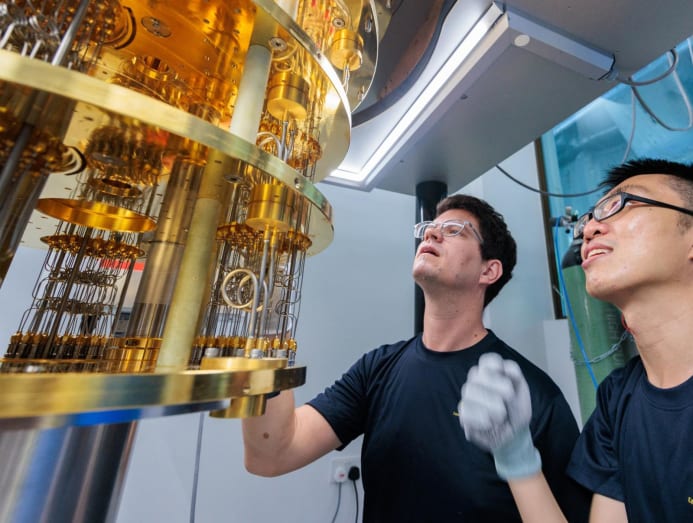
NEW DRUGS, BETTER WAYS TO INVEST
With such tremendous computing power, quantum computing offers several opportunities for industries across the board.
For example, its use could add momentum to another technological advancement that is already having an impact on the way we work and live: AI.
Mr Shanmuga Sunthar Muniandy, director of architecture and chief evangelist for Asia Pacific at data management provider Denodo, said: "It can accelerate the training of complex models with massive datasets.
"This could transform fields like healthcare, (allowing) for earlier and more accurate disease detection, or even finance, where quantum algorithms could improve risk modelling and portfolio optimisation."
Beyond that, quantum computers could simulate molecular interactions, speeding up drug discovery and development, he added.
In the field of supply and logistics chains, quantum computers could further optimise complex rerouting and inventory management faster than existing systems. Market fluctuations, demand shifts and supplier disruptions could also potentially be predicted using quantum computing.
The technology could also help make progress in tackling some of humanity's greatest challenges.
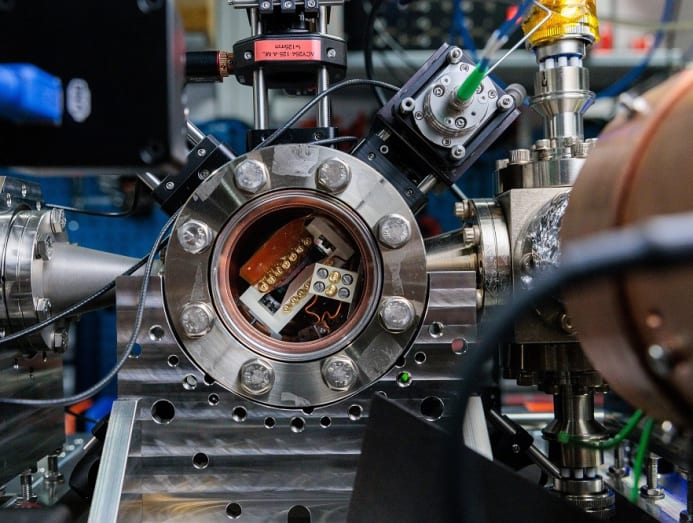
Quantum computers could improve climate modelling, enabling scientists to simulate climate systems more accurately and advance environmental research, Mr Shanmuga said.
These and other benefits will indirectly have an impact on most people, Dr Su said. "Better products, cleaner energy and more effective medicines, all developed faster than ever before."
He added: "For Singapore, these breakthroughs could strengthen key sectors such as healthcare, energy and advanced manufacturing, keeping us competitive in a future where knowledge and innovation drive growth."
There are also potential benefits for Singapore's Home Team, senior scientist Wong Swee Liang said.
Dr Wong is part of the Disruptive Technologies Office with HTX (Home Team Science and Technology Agency), which explores frontier science and emerging technologies for opportunities and threats to Singapore's safety and security.
One potential application of quantum computing is analysing hazardous substances.
"We could use quantum simulations powered by quantum computers to better understand chemical, biological or toxic agents.
"This would help first responders quickly identify threats and determine the safest ways to mitigate them," Dr Wong said.
Besides that, quantum computing could optimise resource deployment and emergency response routes.
"Quantum computing-enabled simulations of new materials could also help HTX design better protective gear or sensors for first responders in the Home Team, potentially reducing development lead times for lifesaving equipment," he added.
SINGAPORE'S QUANTUM EFFORTS
Professor Lam Ping Koy, chief quantum scientist at A*STAR and programme director of A*STAR's Quantum Innovation Centre, said that numerous countries are already investing in quantum technologies such as quantum computing.
However, the extent of investment and scope of ambition vary widely.
"Some nations, like China and the US, lead with multi-billion-dollar programmes, while others focus on developing niche strengths."
Singapore’s National Quantum Strategy focuses on four thrusts: advancing scientific excellence, building critical engineering capabilities, fostering a vibrant innovation and enterprise ecosystem and nurturing a pipeline of deep tech talent.

Spearheading the strategy is the National Quantum Office (NQO), a national platform hosted by A*STAR that was established in 2022.
Through this office, Singapore aims to "strengthen its long-term competitiveness and position itself as a future-ready hub for quantum technologies," NQO's executive director Ling Keok Tong said.
Mr Ling also said that Singapore has made "strong progress" under the strategy.
"Through national programmes coordinated by NQO, we are translating research into applications, anchoring partnerships with global leaders, and creating early pathways for industry adoption."
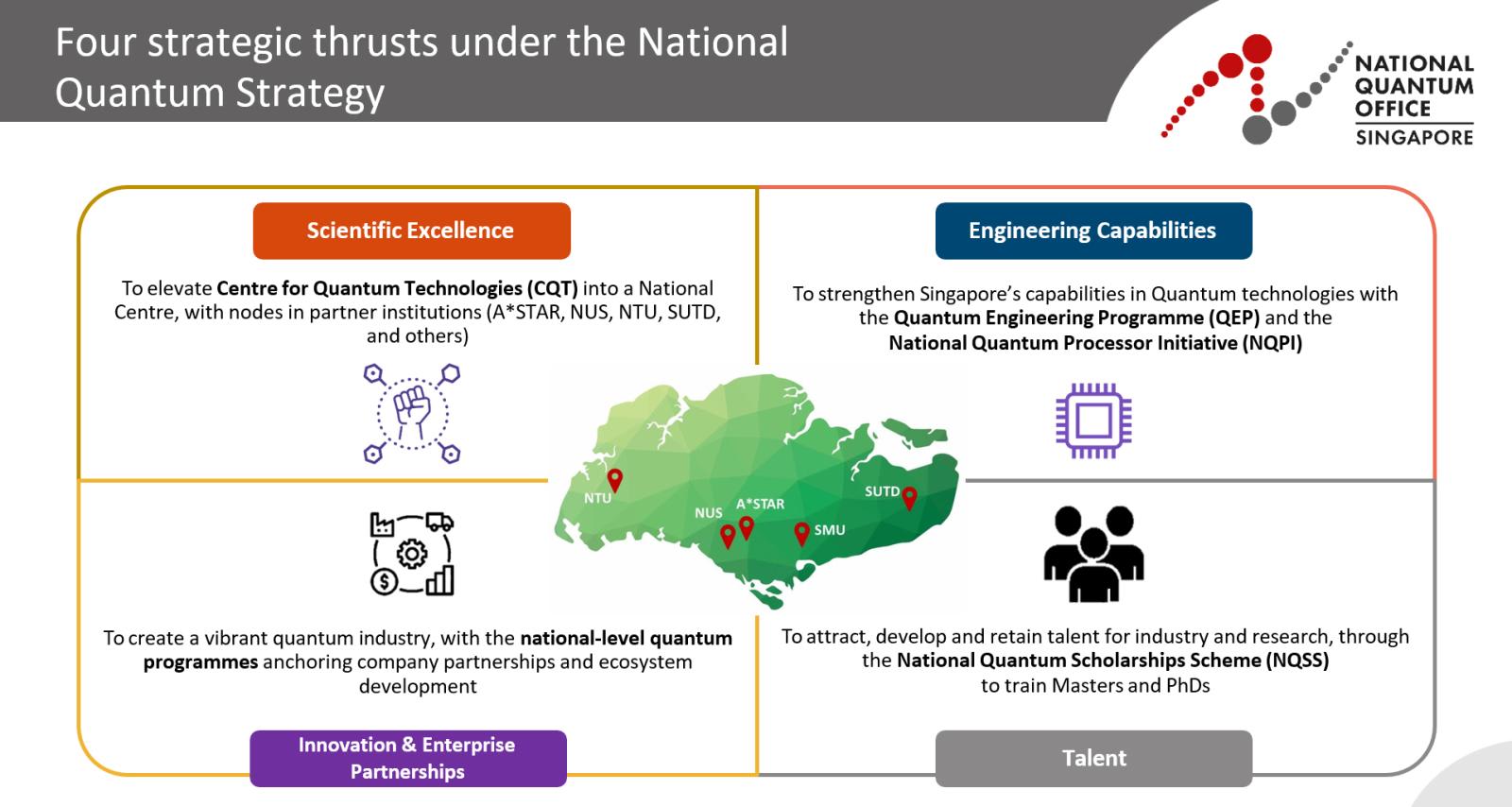
Among the country's long list of efforts to establish Singapore as a leading hub for quantum technologies is growing the talent pool of quantum experts through a scholarship scheme launched in August 2024.
The National Quantum Scholarships Scheme has awarded 20 PhD scholarships so far and aims to award 100 by 2030.
Today, Singapore’s quantum ecosystem comprises more than 300 researchers, said Mr Ling.
There are also efforts to attract global startups and nurture homegrown startups in the quantum space.
Ms Sophia Ng, the executive director for Startup Ecosystem at statutory board Enterprise Singapore, said that there are several initiatives to help achieve this goal. One is partnering with Singapore deep tech venture capitalists such as Eleve8 and Origgin to invest in quantum startups through its Startup SG Equity programme.
Singapore is primed to forge ahead in this field, being home to more than 4,500 tech startups, more than 500 venture capitalists and 220 accelerators and venture builders, she added.
Furthermore, Singapore is one of the fastest-growing startup ecosystems worldwide, having climbed 12 places since 2020 to rank fourth in the 2025 Global Startup Ecosystem Index by Startup Blink, a global startup research platform.
Ms Ng from Enterprise Singapore said that beyond supporting the growth of quantum startups, the agency is focusing its efforts on bringing quantum technologies closer to industry and building awareness among businesses and end-users.
One example is the Singapore Week of Innovation and Technology, its flagship conference that brings together researchers, corporates, investors and startups from around the world to look into deep tech, including quantum technologies. This year's edition will be held from Oct 29 to 31.
Separately, the Infocomm Media Development Authority (IMDA) launched the National Quantum-Safe Network Plus in June 2023 to enhance the resilience and security of businesses in Singapore's digital economy.
Among IMDA's efforts is protecting Singapore from the risks of quantum computers. This includes cybersecurity concerns since quantum computers could, in the future, decrypt existing encryption protections today.
"This positions Singapore among the first countries to integrate such technologies and ensures our enterprises can securely connect with global markets as other cities roll out their own quantum-safe networks," Dr Ong Chen Hui, who is IMDA's assistant chief executive of its BizTech Group, said.
"Our vision is to eventually integrate Singapore's secure network with similar networks that other countries are building, creating a worldwide system of quantum-safe internet connections.
"This would enable businesses to future-proof communications for industries where data integrity is critical, such as financial, healthcare and legal."
It is not just the Singapore government that is investing in frontier technology. Large corporations here are also doing so.
Singtel is one such company, having invested in quantum-safe technologies since 2022. The telco also launched Southeast Asia's first quantum-safe network with ID Quantique.
The service supports organisations in key industries such as homeland security and finance to adopt quantum technologies, Singtel's chief executive officer Ng Tian Chong said.
"We encourage all enterprises to start learning and trialling the technology, so they are ready to adopt quantum-safe solutions to protect their critical assets," he added.
Similarly, OCBC developed a quantum roadmap in 2021 to advance its technological capabilities and stay at the forefront of innovation.
The bank is collaborating with the National University of Singapore, Nanyang Technological University and Singapore Management University to assess the suitability of applying quantum technology to key banking operations, among other initiatives.
It is also one of the first to train employees in quantum technology and aims to train more than 100 employees at an intermediate proficiency level by 2026.
As of the end of 2024, around 50 employees had been trained and they possessed at least intermediate proficiency in quantum technology, OCBC said last month.
Mr Wilson from KPMG said: "Singapore is not merely experimenting, it is positioning itself as a quantum hub for Asia and beyond.
"The government recognises quantum computing's transformative potential across sectors like biotech, finance and national security, and is backing that vision with robust policy frameworks, strategic partnerships and funding."
EARLY DAYS, BUT NOT JUST EMPTY HYPE
In an office at One-North, a group of quantum experts type furiously on their computers. The office walls – painted with whiteboard paint – are filled with calculations and code that most people would find hard to comprehend.
In one room, a group of experts are deep in discussion with colleagues based in Dublin, Ireland, filling up their notebooks with more formulae and code as the meeting progresses.
They all share a common goal: to create software that will allow developers to use quantum computers easily, allowing them to tackle real-world problems.
They are part of Horizon Quantum, a startup founded in Singapore with an office in Dublin.
Dr Joe Fitzsimons, the startup's chief executive officer, told CNA TODAY that the company has developed its own programming languages and compilers, and has already run them on existing quantum computers.
"As we push the limits of what is possible within quantum programming, we are starting to see the elements of a first true quantum operating system, analogous to the Linux or Windows kernels, emerging from our work."
His company is part of a growing number of startups in Singapore's quantum technologies startup scene.
Like many other startup founders who spoke to CNA TODAY, Dr Fitzsimons acknowledged that quantum computing and quantum technologies are still at an early stage, but said that now is the best time to join the industry.
His view is that quantum computing has the potential to make a significant impact on the world just as mainstream computers have.
"However, it has taken more than 80 years to go from the very first computers to the advances in generative AI we see today — advances that would not be possible without 80 years of computer hardware development.
"Quantum computing is very similar … It will certainly take time for the real impact of the technology to be felt."
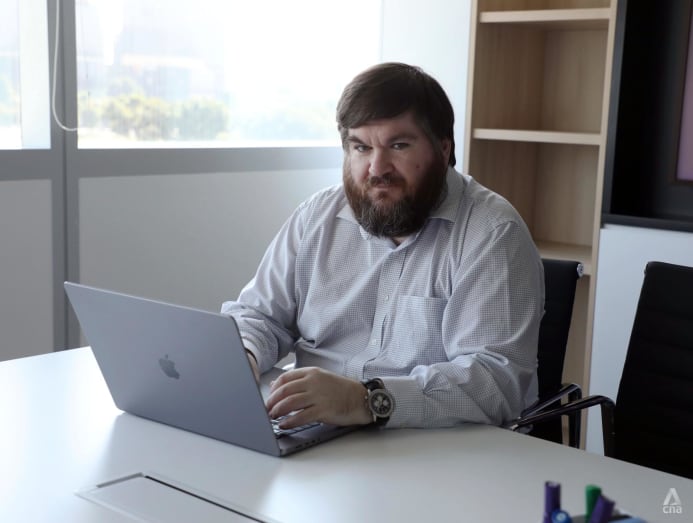
That said, there are some challenges to tackle in the meantime.
"Quantum computing is powerful, but fragile. It holds immense promise, but it’s still a delicate beast. Among the key hurdles in quantum computing research are the challenges of stabilising qubits, scaling quantum systems and developing robust software frameworks," Mr Wilson from KPMG said.
Since qubits are extremely sensitive to their environment, including heat, this limits their duration and reliability.
"Building quantum machines with enough qubits that can interact reliably, while keeping error rates low, is no small feat," Mr Wilson said.
"The hardware itself is complex and costly, often requiring ultra-low temperatures just to keep the qubits stable."
Mr Shanmuga from data management firm Denodo said that quantum computers are expensive and complex to build. Specialised talent in the field also remains in short supply.
Quantum computers also consume a large amount of energy and their production requires the extraction of specialised materials to build their components.
"Looking at the potential impact of quantum computer systems' energy consumption requirements, conscious decisions need to be made to balance it with efficient, renewable and clean energy-based power management systems," he added.
Given the many hurdles, the opportunities that quantum computing could yield have yet to materialise as the technology is still in its infancy.
However, experts emphasised that it is not simply another passing tech fad such as the metaverse.
For one thing, quantum computers already exist and there have been major improvements in accuracy and stability over the past five years, Dr Upton from Cambridge Consultants noted.
Mr Shanmuga said: "The pace of progress in recent years, from rapid technological innovations to promising application testing, suggests that quantum computing may become a practical reality much sooner than expected."
This could happen within the next decade at the earliest.
He also observed "strong global investment momentum" from several players, including tech giants such as IBM and Google, as well as quantum specialists. Government-backed initiatives in key markets, including China, Europe, Japan, Singapore and the US, are expected to drive progress further.
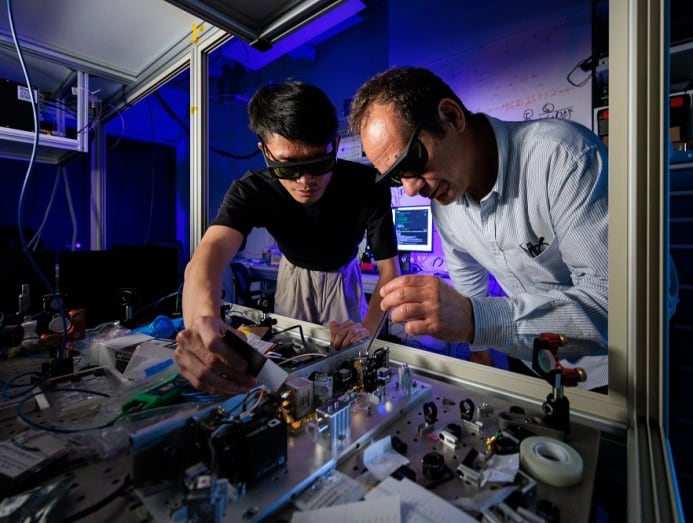
THE RISK OF NOT TAKING QUANTUM COMPUTING SERIOUSLY
Not investing in quantum technologies and quantum computing could also pose a risk for Singapore, especially in the cybersecurity space.
At Singapore-based startups pQCee and SpeQtral, the race is on to develop quantum-safe technologies to protect private and sensitive data.
Today, most digital information is protected through encryption, often generated using mathematical problems such as factorisation and logarithms.
However, quantum computers, if sufficiently powerful, could solve those problems quickly, cracking most of today's encryption and exposing classified or personal data.
The bigger concern? That threat actors are already preparing to use this powerful technology to wreak havoc.
Mr Lum Chune Yang, co-founder and CEO of SpeQtral, said: "The issue is that bad actors have adopted a 'harvest now, decrypt later' approach … collecting encrypted data now in hopes of cracking it once quantum computers become more advanced."
This is why his firm focuses on quantum key distribution – using quantum light sources and satellites to distribute encryption keys securely.
"The everyday person is likely not too concerned about their data. But when it comes to critical infrastructure, financial institutions, defence industries and governments, such quantum-safe technology is critical today."
Agreeing, Dr Tan Teik Guan, CEO and co-founder of pQCee, said that it is important to build products and solutions to defend against quantum computers before the threats they might bring become a reality.
His startup works on post-quantum cybersecurity, developing encryption methods such as post-quantum cryptography.
In other words, his firm is creating encryption that is safe from being solved through the use of quantum computing.
These quantum-safe technologies are to mitigate the cybersecurity risk quantum computers pose, such as the ability to crack existing encryption methods.
"The threats quantum computing poses are very real today … There's a lot of potential, but there's also a need to protect against it early and be one step ahead."
Beyond that, Mr Ling from the National Quantum Office said that Singapore's long-term competitiveness depends on building capabilities in technologies "that will shape the future".
"Quantum has the potential to transform industries such as finance, healthcare and logistics. These are areas that are critical to our economy and society.
"For a small nation, a clear and coordinated strategy ensures that we focus resources on areas where Singapore can build unique strengths and global relevance."
The country's small size would allow it to move quickly, align stakeholders and build a tightly connected quantum technologies ecosystem, Mr Ling added.
"By combining this agility with strong international partnerships, Singapore is creating a leading environment for innovation and adoption. This positions us as a competitive and reliable partner in the global quantum ecosystem."
Likening Singapore's investments in quantum technologies today to its early investments in the internet in the 1980s, Dr Su from the National Quantum Computing Hub said that the country has always taken a long-term approach.
"Instead of chasing quick wins, we are investing in the capabilities, infrastructure and talent needed to be ready when the technology matures," he added.
"With quantum computing, we are laying the foundation today through research programmes, infrastructure and scholarships to train the next generation, so that Singapore is ready to capture its benefits when the time comes."
Dr Fitzsimons from Horizon Quantum said: "To me, it feels as if working on quantum computing today is like working on personal computing in the 1970s and '80s, or computing in the '50s and '60s.
"The technology has not fully proven itself yet, but that only increases the importance of today's work."















